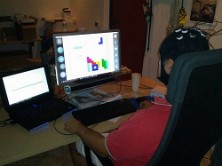Browse the web by simply gazing and thinking
Using a mouse and keyboard requires accurate motor control from a healthy nervous and muscular system. Recently developed alternative means of accessing the web include eye and mind control. Further development of these technologies has been fuelled by the needs of people with disabilities. Potential end users could be cases where intellectual function is preserved but neuromuscular control is diminished as seen in muscular dystrophy, multiple sclerosis, Parkinson’s disease and spinal cord injury. Keeping an eye on the digital world To avoid people with functional deficits losing touch with the fast-moving internet-based society, the MAMEM(opens in new window) project has developed GazeTheWeb. “A framework for full-featured web browsing with eye-based input, it integrates the visual appearance and control functionality of web pages in an eye-tracking environment,” outlines Dr Spiros Nikolopoulos, MAMEM research fellow. GazeTheWeb combines both web page element extraction and emulation of traditional input devices within the browser to provide smooth and reliable web access. “It not only supports efficient interaction with the web page such as scrolling and link navigation, but also all essential browsing menu operations like bookmarks,” adds Dr Nikolopoulos. “However, the MAMEM project has gone far beyond simple gaze-based interaction and has extended GazeTheWeb with brain-computer interfaces (BCIs) implementing an error-aware gaze-based keyboard,” he adds. Typing via the eyes is a rather error-prone procedure that frequently requires the user to gaze away from the main typing area, and press backspace to go back. To avoid this, the researchers used a natural feature of the brain that occurs when the user realises an error has been made. This error-related potential can be seen in electroencephalogram (EEG) signals. “Instead of asking the user to press backspace in the case of an error, we have implemented a system that lets the brain perform this action by using the generated EEG signals to detect the error-related potential,” Dr Nikolopoulos explains. This excellent example of effectively combining eye tracking with EEG-based BCIs has been published in Nature’s Scientific Reports(opens in new window). GazeTheWeb on trial Phase I of the pilot trials assessed the MAMEM platform in a controlled environment for its feasibility and usability. Eighteen able-bodied participants and 16 subjects with neuromuscular diseases, Parkinson’s disease and spinal cord injury were exposed to the platform for a few hours and completed a set of specially designed tasks. The second phase evaluated the MAMEM platform in an uncontrolled environment – users’ homes. Trained on a laptop installed with the MAMEM system for their everyday computer-based activities, their online activities were monitored and stored for further analysis. Questionnaires were completed pre-use and at the end, designed to evaluate the platform from the user perspective. Future focus on GazeTheWeb with an eye on the market After intensive evaluation, the consortium has decided to position GazeTheWeb at the core of the project’s exploitation efforts. As such, all other MAMEM technologies are being used as plug-ins complementing or extending the functionality of GazeTheWeb. For example, the MAMEM project also modified the popular TETRIS game, a tile-matching puzzle video game, and produced MM-Tetris, a hands-free version using gaze and mind control. “We consider that GazeTheWeb is the most mature of MAMEM’s products and it’s possible a leading partner, the University of Koblenz – Landau , may form a spin-off to exploit the platform supported by seed funding or some other vehicle for business acceleration,” concludes Dr Nikolopoulos.







